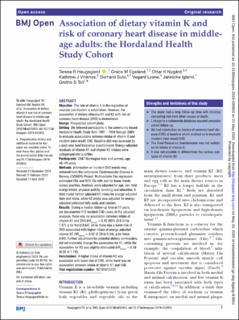Association of dietary vitamin K and risk of coronary heart disease in middle-age adults: the Hordaland Health Study Cohort
Haugsgjerd, Teresa Risan; Egeland, Grace M.; Nygård, Ottar; Vinknes, Kathrine; Sulo, Gerhard; Lysne, Vegard; Igland, Jannicke; Tell, Grethe S.
Journal article, Peer reviewed
Published version

Åpne
Permanent lenke
https://hdl.handle.net/11250/2728569Utgivelsesdato
2020Metadata
Vis full innførselSamlinger
Sammendrag
Objective: The role of vitamin K in the regulation of vascular calcification is established. However, the association of dietary vitamins K1 and K2 with risk of coronary heart disease (CHD) is inconclusive.
Design: Prospective cohort study.
Setting: We followed participants in the community-based Hordaland Health Study from 1997 - 1999 through 2009 to evaluate associations between intake of vitamin K and incident (new onset) CHD. Baseline diet was assessed by a past-year food frequency questionnaire. Energy-adjusted residuals of vitamin K1 and vitamin K2 intakes were categorised into quartiles.
Participants: 2987 Norwegian men and women, age 46–49 years.
Methods: Information on incident CHD events was obtained from the nationwide Cardiovascular Disease in Norway (CVDNOR) Project. Multivariable Cox regression estimated HRs and 95% CIs with test for linear trends across quartiles. Analyses were adjusted for age, sex, total energy intake, physical activity, smoking and education. A third model further adjusted K1 intake for energy-adjusted fibre and folate, while K2 intake was adjusted for energy-adjusted saturated fatty acids and calcium.
Results: During a median follow-up time of 11 years, we documented 112 incident CHD cases. In the adjusted analyses, there was no association between intake of vitamin K1 and CHD (HRQ4vsQ1 = 0.92 (95% CI 0.54 to 1.57), p for trend 0.64), while there was a lower risk of CHD associated with higher intake of energy-adjusted vitamin K2 (HRQ4vsQ1 = 0.52 (0.29 to 0.94), p for trend 0.03). Further adjustment for potential dietary confounders did not materially change the association for K1, while the association for K2 was slightly attenuated (HRQ4vsQ1 = 0.58 (0.28 to 1.19)).
Conclusions: A higher intake of vitamin K2 was associated with lower risk of CHD, while there was no association between intake of vitamin K1 and CHD.
